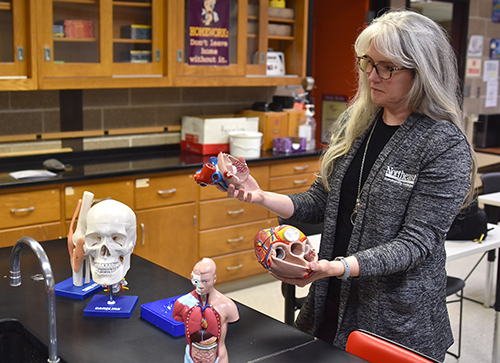NORFOLK, Neb. – Jennifer Judt admits she doesn’t participate in contests very often, but the Northeast Community College biology instructor is glad she took the time to try her luck in one particular event earlier this year. “I don't usually enter drawings, but I did this time. And it paid off.”
Judt is one of three national winners in a contest sponsored by Carolina Biological Supply Co. that awarded teaching materials to science teachers. She received four anatomical models - an oversized human heart, a skull with the cervical vertebrae attached, a knee joint, and a micro torso that features removable organs. They have a total value of approximately $500.
Judt said the models will supplement other materials she and her colleagues use in their classes. She really likes the size of the new models.
“If you have a student who's studying by themselves or in a small group, it's ideal,” Judt said. “We've got a larger older model with organs which can be frustrating sometimes when you get all of the them out; it takes up a lot of space. And these new models are easier to store because of their size.”
The models will be used primarily in introductory anatomy and physiology classes that focus on the study of bones, joints, and organ systems.
“Students won’t get into the heart until Human Anatomy and Physiology II, but these all fit into our curriculum and our Intro to Anatomy I.”
The models will also be incorporated into Northeast’s new Science Study Area, which is a place where students may go to study when the science lab is in use. It has been designed to assist students who may need extra assistance or for those who may want to put in extra time to work on assignments.
“We'll have classes in the lab, and we'll have a group of students waiting to get into the study area to do some extra studying outside of their class time. They’ll be able to also use the new models in there as well. That little guy (micro torso) is going to be perfect in that type of situation and not take up a ton of space so students can get hands-on individual work.”
Northeast students do have the opportunity to utilize technology software in anatomy and physiology classes. However, Judt feels the models provide added value to the students.
“When it’s something like muscles, everyone can see how they work. They can then look at animations on the computer to see how they would look with the skin and everything gone, how they move and what bones are pulling on and so on,” she said. “Really, when it gets down to it, these hands-on models are great for most students to learn because it's something tangible that they can actually pick up, hold and move and visualize how the parts come together more than they can in two-dimensional animation. So, we can look at animations, but I still don't think there's any substitute for these big hands-on 3D models.
The other winners in Carolina Biological Supply’s contest are high school teachers in Minnesota and South Carolina. Judt said she is pleased she entered the drawing and feels she earned the best prize. One of the other teachers received preserved specimens, which cannot be reused after they are dissected.
“When I saw the email and it said, ‘You were selected as a winner,’ I went back to the original email to see what I entered and then I went on their website to see what these things looked like,” she said. “I just may have to enter more contests.”
--###--
PHOTO CUTLINE
Jennifer Judt, a biology instructor at Northeast Community College, displays a set of anatomical models she won in a national contest. The models have been incorporated into classes and used in the College’s Science Study Area.

